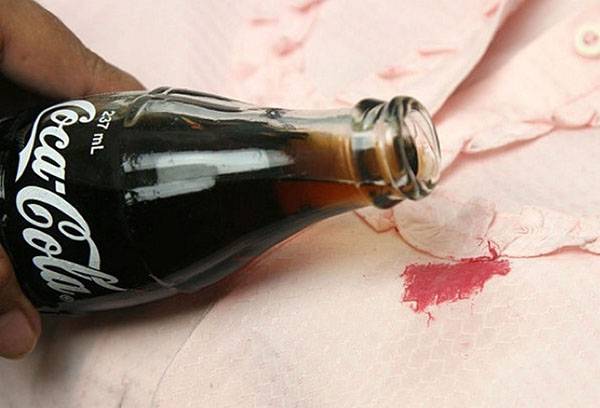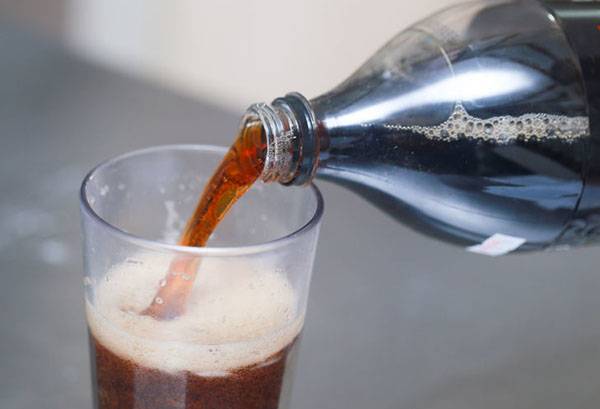What contaminants and how can you remove them with cola?
How often do you hear: “Yes, this cola of yours dissolves rust and limestone, imagine what it will do to your stomach!” Today we will check whether a stain can really be removed with Pepsi or Coke.

What can be cleaned?
We will not refute the cleaning properties of Coca-Cola: so many videos have been shot with experiments, both by famous TV shows and by ordinary people, that its effectiveness in removing certain types of stains is not in doubt. In what situations might a can of this soda be better than household chemicals?
- Precious metals
Coca Cola will help you get rid of stains on your favorite silver spoons or refresh your grandmother’s gold ring. To do this, the product needs to be soaked in soda for several hours (up to a day, depending on the condition of the metal), and then thoroughly polished. The obvious advantage here is that you do not use absolutely any abrasive, which means the product will not be scratched.
- Other metals
Here, the use of soda ranges from removing burnt marks from a pan after you put dumplings on the stove and surfed the Internet, to dissolving plaque and rust from car parts. With dishes, it is recommended to use boiling cola over low heat for an hour, and soak small parts in soda for a day or even several, and then thoroughly wipe off corroded rust.
- Plumbing and household appliances
Limescale deposits from hard water will ruin the reputation of even the cleanest housewife. Unless, of course, you trust cola to remove it. The same applies to scale in the kettle, which forms for the same reason. Rubbing or boiling will help quickly get rid of the problem.
- Cloth
Cola is great for removing greasy stains both on clothes and, for example, on the stove, so soaking greasy stains near the burners or pouring a little cola into the washing machine when washing is a good idea. But if you overdo it, cola stains may remain on your clothes, so we don’t recommend washing your evening blouse this way.
- Glass
Cleaning mirrors or windows with cola is a bad idea. It will take you a long time to remove stickiness from glass, and in the case of such light stains there is simply no point in complicating the process. But if the glass area is small and there is a lot of dirt, as, for example, on the headlights in bad weather, then wiping them with a cloth soaked in cola is a simple, handy way to restore the brightness of the lighting.
Advice
Cola leaves a stickiness and can stain things - this should be taken into account before using it, especially for cleaning clothes.
How it works?
Recognizing the effectiveness of cola is not enough: we want to know how it works, and whether it should replace the usual household chemicals.
The secret of Coca-Cola is that this drink contains a huge amount of phosphoric and citric acid, which are not felt in the taste due to an even more impressive amount of sugar. The acidity of the drink ends up being equal to a 3% solution of vinegar, another product often used to clean various things and surfaces.At the same time, all its cleaning properties depend on pH values, and there is no secret ingredient in the composition.
By the way
Contrary to the stories, cola is no more dangerous for the stomach than freshly squeezed orange juice if you drink it in moderation. What poses a real health hazard in its composition is the huge amount of sugar. Experiments with dissolving a piece of meat in cola do not take into account the fact that gastric juice cannot cope with such substances, and the period of time cola remains in the stomach is certainly not calculated in days, as in such experiments.
But then it turns out that the same solution of vinegar or citric acid will clean your stains just as well? Exactly. Moreover, any liquid with a similar pH level can do this – even apple juice! Does cola have any benefits now?
- Natural apple or lemon juice with high acidity is difficult to obtain, because store-bought juice is not suitable for this purpose. And, after spending money on buying fruit and time squeezing juice, you are unlikely to want to soak car parts in it.
- Vinegar might have beaten cola on our list if it weren't for its smell. Often, after cleaning something with vinegar, you have to clean it again, but this time in order to remove this sharp and persistent “aroma”. In addition, if you have vinegar essence that needs to be diluted, then the risk of miscalculating the proportion and getting a very aggressive cleaning agent that can harm things is quite high.
- But citric acid will probably outperform cola. Judge for yourself: you can get any concentration of the solution, it costs a penny, it has the same properties, but you don’t have to clean the thing from the sticky sugar layer that will remain after using cola.
You can carry out all the actions described above using regular citric acid, so using cola to clean things and surfaces is an interesting, but not optimal way to get rid of dirt.
